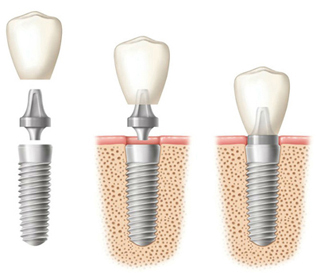My wife thinks I went overboard with dental implant consultations, but I saw four dentists about implant overdentures. After wearing upper and lower dentures for 15 years, I decided to get four implants for my lower denture this year. After paying off the first set of implants, I want four implants for my upper denture. I have not chosen a surgeon yet, but I am gathering information about what to expect before and after surgery. The consultations are not long enough to answer all my questions, but I am sure I will get more information once I sign a contract with a surgeon and restoring dentist. My question for your practice is about eating after implant surgery. My wife and I are socially active, and I wonder how long dental implants will affect our gatherings and dining out with friends. – Thank you. Steve from West Palm Beach, FL
Steve,
Thank you for contacting our office. Your research on implant dentures will help you become an informed patient and hopefully help you have a smooth recovery.
What Can You Eat After Dental Implant Surgery?

Maintain a soft food diet to avoid disturbing your implants and help them fuse with your bone
What you can eat after dental implant surgery has several phases, including the twenty-four to forty-eight hours after surgery, one to two weeks after surgery, and the rest of your recovery. We will explain.
Twenty-four to forty-eight hours after surgery
Limit yourself to a lukewarm or room temperature liquid diet. Avoid drinking icy cold and hot liquids and sugary drinks. Also, avoid drinking through a straw because the suction can dislodge blood clots at the surgical sites.
One to two weeks after surgery
Eat soft foods that do not require chewing. Examples include:
- Applesauce
- Broth
- Gelatin
- Mashed potatoes
- Protein shakes or smoothies without seeds or bits of fruit or vegetables
- Pudding
- Pureed fruits and vegetables
- Yogurt
Two weeks to four months
After two weeks and throughout implant surgery recovery, you can eat foods that require minimal chewing. Avoid crunchy, sticky, chewy, spicy, and hard foods.
- Fruit – Try soft fruits without seeds or skin. Baking fruits such as apples or pears soften the fruit and make it easy to chew.
- Vegetables – You may eat steamed or soft vegetables without stems or small pieces that can get into the implant sites.
- Meat, fish, and other proteins – Finely chopped meats, broth, legumes, flaky fish, or eggs are examples of protein you can enjoy.
Additional Tips on What to Eat
- Throughout dental implant healing, stay hydrated with water and maintain good nutrition.
- Keep protein in your diet to help you heal faster.
- You can search online for soft food diets and recipes, remembering to avoid food that contains stems or seeds or can break into pieces and get lodged in implant sites.
Also, your oral surgeon will give you post-surgical instructions, including a list of foods to eat and avoid.
Focus on Your Goal
We encourage all dental implant patients to be diligent in maintaining a soft food diet to avoid disturbing the implants so they can fuse firmly with your jawbone. Afterward, you can eat just about anything you want. Your implants will become solid anchors for dentures.
Dr. James Gavrilos, a Barrington, Illinois, accredited cosmetic dentist, sponsors this post.
